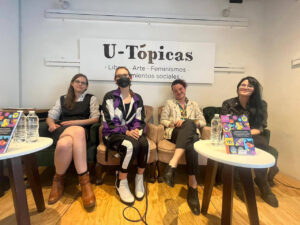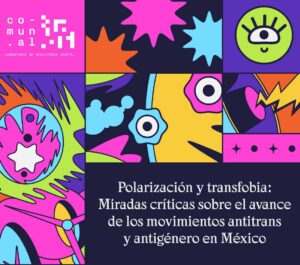While there have been some progressive victories like same-sex marriage and reproductive rights in Mexico, a report’s authors argue that narratives of hate are still prevalent in media coverage.
In hopes of informing people and confronting "different campaigns of disinformation, discrimination and hate that are currently active in our country,” an interdisciplinary group authored a recent report, "Polarization and transphobia: Critical perspectives on the progress of the anti-trans and anti-gender movements in Mexico.”

Book launch at the U-Tópicas bookstore in Mexico City on March 23, 2023, from left to right: Julianna Neuhauser, Ayla Díaz, Raúl Cruz and Alex Argüelles. (Photo credit: Mariana Riestra)
The report, which was published in March 2023, includes essays by journalist Julianna Neuhauser, technologist Alex Argüelles, digital journalist Raúl Cruz, and reproductive rights activist Ayla Díaz, and was illustrated by Astra Lem.
While the anti-trans and anti-gender movements in Mexico are not necessarily ideological, they are exploited for commercial and political ends, Cruz told LatAm Journalism Review (LJR).
“It's not Fox News, it's a long way from being Fox News [...], but they are normalizing and amplifying hate speech,” said Cruz, who has written for digital news outlets for ten years and was a selected participant in the 360/Digital Sherlocks Training Program.
The issue of transphobia “has always been a constant issue because, in the media, LGBTQ+ populations are either a joke or they are news in the nota roja vein, right?" Cruz said. Nota roja is a type of journalism that focuses primarily on extreme violence.
Cruz and Argüelles pointed to an emblematic case of anti-trans bias in Mexican newspapers based on social media rumors that drew a lot of attention: the case of Mexican boxer Tamara Cruz, who on March 25, 2023 lost to Algerian boxer Imane Khelif, who was later disqualified for having shown high levels of testosterone in tests. Later legacy media like El Universal, Milenio and Excélsior falsely stated that Khelif was a transexual boxer around March 30. A couple of days later news outlets like Aristegui Noticias and Animal Político debunked the news.
Same-sex rights are nonexistent in Algeria, and transgressions are penalized with prison for up to three years, according to their penal code. Algerian authorities would’ve never knowingly allowed a trans boxer to represent them in domestic or international championships. However, the damage to Khelif’s reputation had been done. Cruz and Arguelles argued that those Mexican news outlets could have at least admitted their error. However, those articles were still online as of July 24, 2023.
The speed of reposting on social media networks like Twitter and TikTok makes it that much harder for editorial staff to vet content to ensure its accuracy, Cruz said.
There are some exceptions to anti-trans coverage, including independent news outlets Volcánicas, Presentes, Altavoz LGBT and Malvestida, Cruz said. These digital native sites focus on gender, feminism, LGBTQ+ rights, and human rights.
According to Cruz, journalism’s precarious working conditions and a business economic incentive to generate audiences through clicks create a dangerous mix in which anti-trans articles are propagated, threatening the LGTBQ+ people’s dignity and human rights, and even put them at risk.
In Mexico, the LGBTQ+ population is made up of five million people (5.1% of the population aged 15 and over) or one in 20 people, according to a government survey on gender from 2021. However, it skews young — 67.5% of the population that recognizes itself as LGBTQ+ is between 15 and 29 years old, and 20.3% is between 30 and 44 years old. Meanwhile, 0.9% identified as trans (some 909,000 people).
Mexico will hold federal elections in 2024, in which not only the presidency of the republic will be contested, but also the positions of deputies and senators. "It’s practically certain that we are going to begin to see the use of transphobic discourse as a political agenda,” Cruz told LJR.
Some politicians have promoted some pro-LGBTQ+ acts, such as obtaining a non-binary INE voter card. The INE card is a de-facto ID in Mexico. Passports have also been updated to include a non-binary designation. For instance, presidential primary candidate Marcelo Ebrard, of the ruling Morena party, attended the launch of this new passport modality. However, those gestures are not enough, said Argüelles, founder of comun.al, a digital resilience lab that promotes open-source use of technology as a human rights and justice tool.
Cruz said the media can improve their coverage of the LGBTQ+ people in Mexico by “having LGBTQ+ people in newsrooms. Second, having LGBTQ+ people in editorial decision-making positions. And third, removing pressure to generate content in such an overwhelming way.” In some news outlets, journalists are often required to work under tight deadlines and produce multiple stories per day, Cruz said.
And instead of continuing to produce victimizing narratives of trans people, journalists should try to approach everyday trans people who are “going through incredible and super relevant battles,” Argüelles said.

Cover of the book "Polarization and transphobia: Critical views on the advance of the anti-trans and anti-gender movements in Mexico." (Illustrations by Astra Lem)
Trans people "have jobs where we are people who speak publicly, we organize communities, we resist, we transform things, we support each other, and you don't see that in the media." You must approach the people who are doing local activism, Argüelles told LJR.
Other ways to improve coverage would be to "forge solidarity between movements," according to Argüelles, such as different types of feminism, the history of Indigenous peoples in Mexico, even the struggles of neurodivergent people. "I feel that this part of losing the fear of complexity, being strategic in how media build content from this journalistic information is super relevant."
Argüelles also recommended forming links with other organizations and networks, such as the newly formed Network for Diversity in Latin American Journalism, which was created thanks in part to the support of the Knight Center for Journalism in the Americas. Cruz was very involved in the early meetings of the diversity network.
"I am very concerned about the job insecurity of journalism in Mexico [...] and without being able to formalize online journalistic work, we cannot speak of equitable diversity,” Cruz said.
The fight for visibility and inclusion is also a response to a mental health crisis in the LGBTQ+ community, Argüelles said. “An act of generosity transforms a life. I feel we’ve had enough cruelty, and it’s worth doing something different.”